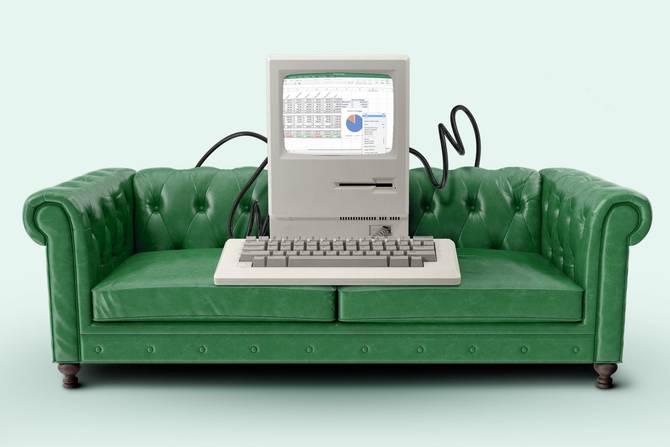Hi there! Not counting today, there are two working days left in July, and then it’s August, which means it’s basically already Labor Day, which means summer is practically over. We know your staff is stepping away from their desks (see our stat of the day), but have you taken PTO? Yeah, schedule that.
In today’s edition:
 DE&I dollars DE&I dollars
 Robo-worker wars? Robo-worker wars?
 Coworking Coworking
—Susanna Vogel, Kristen Parisi
|
|
Getty Images
What happened to the billions of dollars companies pledged to spend on racial equity in the wake of George Floyd’s murder?
Consultants at Creative Investment Research (CIR) counted that 271 US corporations had made DE&I pledges relating to racial justice since the summer of 2020 worth an estimated $67 billion. The Financial Times reported the CIR’s finding that by the beginning of this year, some companies had spent just $652 million.
That’s less than 1% of what was promised.
“They haven’t really done anything that would lead one to believe that they are committed, with some exceptions,” William Michael Cunningham, CIR’s CEO, told the Financial Times.
While corporate DE&I pledges, in Cunningham’s words, have largely “petered out” since 2020, public support for initiatives and corporate action regarding racial equity in the workplace has ramped up: 92% of Americans surveyed for Just Capital’s Corporate Racial Equity Tracker said that “it is important for companies to promote racial diversity and equity in the workplace,” up 13 points from last year. Nearly seven in 10 Americans said companies have “more work to do.” Among Black Americans surveyed, that number jumps to almost nine in 10.
With those statistics in mind, keeping promises to promote racial equity in the workplace seems like a good area for HR to keep the focus on. So, what’s the hold up for some of these companies? Experts told HR Brew that short attention spans and fear of alienating staff can keep programs from taking flight, but slight tweaks in approach can make a difference. Keep reading here.—SV
Do you work in HR or have information about your HR department we should know? Email [email protected] or DM @SusannaVogel1 on Twitter. For completely confidential conversations, ask Susanna for her number on Signal.
|
|
|
The remote vs. in person debate is still raging, but the stats don’t lie—40% of job seekers are looking for remote-only positions.
Meet this unique hiring moment with Built In’s new guide, How to Create a Successful Hybrid Work Environment. With insight from 1k+ tech professionals, it’s the ultimate guide for shaping a successful hybrid work environment and meeting your employees’ demands.
Build policies that support effective communication, alignment, and engagement, all of which are especially crucial in a flexible work environment.
Meeting this workforce’s diverse needs will take work, and Built In has the tools to get you there.
Download your copy today.
|
|
Disney Pixar/Wall-E via Giphy
Picture this: Wall-E conducting performance reviews. Thanks to recent technological advancements, robots may soon be up to performing your least favorite tasks.
The case for autonomous, robotic employees is nothing new, and while technologists like Elon Musk warn that robots may take over jobs from people, some business leaders argue that robot coworkers (sometimes referred to as “cobots”) could actually make the workplace better for employees by reducing their workload. New research by scholars at the University of Pittsburgh found that while robots usually reduce errors and injuries when employed in factory settings, exposure to robots could negatively affect employees’ mental health.
What’s happening? While Americans with robot coworkers may be less likely to be injured on the job than their cobot-less counterparts, the research, published in the October 2022 issue of Labour Economics, found that they are 10.5% more likely to die as a result of drugs or alcohol abuse.
“On one hand, robots could take on some of the most strenuous, physically intensive, and risky tasks, reducing workers’ risk,” Osea Giuntella, an assistant professor of economics at University of Pittsburgh and coauthor of the research, told the university publication Pittwire. “On the other hand, the competition with robots may increase the pressure on workers who may lose their jobs or be forced to retrain.”
Yes, but...The study found that there were “no significant effects” on the mental health of people in Germany working alongside industrial robots. Keep reading here.—KP
Do you work in HR or have information about your HR department we should know? Email [email protected] or DM @Kris10Parisi on Twitter. For completely confidential conversations, ask Kristen for her number on Signal.
|
|
On Wednesdays, we schedule our weekly 1:1 with HR Brew’s readers. Want to be featured in an upcoming edition? Click here to introduce yourself.
Peter Sursi is the head of financial processing and modernization in the finance division of the Federal Bureau of Investigation. He was previously the head of talent acquisition at the FBI, responsible for running the bureau’s recruitment strategy. Sursi recently told HR Brew how the FBI stays ahead of job openings and handles recruitment challenges.
How would you describe your specific job to someone who doesn’t work in HR? I’m still an HR guy even while I’m in finance, so I’m bringing those skills to the table as I help the FBI’s financial payments team modernize, deal with tons of change, and create a culture of transparency and communication. It’s amazing to me how relevant HR skills are [to] leading a non-HR division. Run-of-the-mill issues for us—dealing with performance, creating a healthy culture, emotional labor, creating a hiring strategy, putting structure around promotions, etc.—are very relevant outside of HR. Though, leading a team of 200 accountants and financial analysts is super different than leading my HR team, that is for sure. I’m still getting used to that.
What’s the best change you’ve made at a place you’ve worked? Since my team is in 14 locations around the country, people were feeling very disconnected and out of touch. I changed our communication and meeting strategy from “meet/communicate when you have something to say/something you need” to a structured cadence of video leadership meetings, all-hands, and virtual one-on-ones with my team.
What’s the biggest misconception people might have about your job? Keep reading here.
Want to be featured in an upcoming edition of Coworking? Click here to introduce yourself.
|
|
TOGETHER WITH EDEN HEALTH
|
|
Money is on everyone’s mind. And rising healthcare costs aren’t helping, especially when 25% of healthcare spend is considered wasted. Luckily, Eden Health is able to lower total cost of care by integrating primary care, mental health, care navigation, and more in one easy-to-use benefit. Find out how much you can save with a personalized ROI analysis today.
|
|
Today’s top HR reads.
Stat: 4.8 million US workers took “vacation or personal days” in June, up nearly 30% from 3.7 million the same month last year, according to the Census Bureau. (the Wall Street Journal)
Quote: “We’ll offer outplacement services with access to career coaching, interviewing support, résumé crafting, etc. And because every path taken requires some basics, we’ll continue to pay internet costs for the period, the home office furniture we provided is yours now, and while we’ll need to recover our hardware, we’re offering a kickstart allowance that can be used to buy new laptops. If you want, you can add your email addresses to a list that we will share with other companies looking for talent.”—Tobi Lütke, cofounder and CEO of Shopify, announcing layoffs affecting 10% of the company (Shopify)
Read: You’re not the only one struggling with what to wear to work. Some have even said it’s time to ditch workwear entirely and don a “hybrid wardrobe” seven days a week. (Yahoo Finance)
Support your managers: Managers bear the weight of linking company strategy to day-to-day action—and it’s a lot! Humu helps them succeed with timely, personalized, and easy-to-implement nudges. Request a demo today.*
*This is sponsored advertising content.
|
|
-
Lululemon employees in Washington, DC, filed for a union election last week, demanding “equitable pay structures,” among other things.
-
A Colorado woman claims she was fired after sharing her salary on TikTok; her employer said her videos were a “security concern.”
-
Gen Z expects to earn more than $100k in their first job, according to a recent survey. (The actual average starting salary for college graduates is a little more than $55k.)
-
Some hotels are trying to solve staffing shortages by boosting pay, offering sign-on bonuses, and even investing in robotic talent.
|
|
Catch up on the top HR Brew stories from the recent past:
|
|
|








